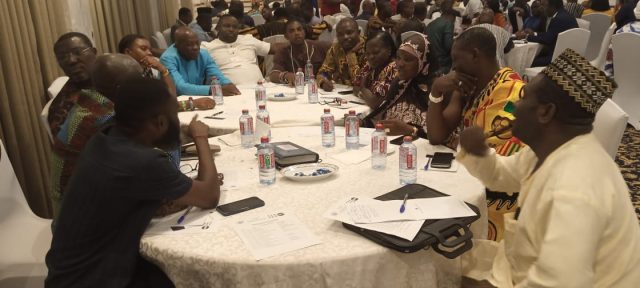The Ministry of Chieftaincy and Religious Affairs MCRA with support from the United Nations Population Fund (UNFPA) has organized regional stakeholders consultation on a proposed National Policy on Religion held on 27th November 2023, at the
La Palm Royal Beach Hotel in Accra.
The National Policy on Religion aims to address the challenges and opportunities that arise from the coexistence of different faiths and beliefs in our society. It will also provide a framework for the protection and promotion of the rights and freedoms of all religious groups, as well as the prevention and resolution of conflicts that may arise from religious differences.
According to the 2021 Population and Housing Census by the Ghana Statistical Service (GSS) identified 21.9 million Ghanaians as Christians, 6.1 million Ghanaians as Muslims, 1 million Ghanaians as Traditionalists, 1.4 million in other religions and about 400,000 non-religious. With these statistics/facts, it is safe to project that almost all Ghanaians are religious.
It is in this regard that the Ministry of Chieftaincy and Religious Affairs is holding this regional stakeholder consultations on a proposed government policy designed to protect the rights and freedoms of all citizens, regardless of their beliefs or non-beliefs.
Delivering his keynote address, Miyemliniba Nii Adjei Oweeni ll, Chief of La Agbawe and member of La Traditional Council, explained that the Ministry of Chieftaincy and Religious Affairs, has two major policy reforms under consideration.
“First is the Review of the Chieftaincy Act, 2008 (Act 759). The Second is the development of a National Policy on Religion, the very reason for this Regional Stakeholder Consultation,” He said.
Adding that the government’s legal framework for proposed Religious Policy is underpinned by Article 21(1)(c) of the 1992 Constitution ‘all persons shall have the right to freedom to practice any religion and to manifest such practice’.
Nii Adjei Oweeni ll, who spoke on behalf of the sector Minister, Mr Stephen Asamoah Boateng, made known that the Regional Stakeholder Consultation is an opportunity to hear from the various religious communities, civil society organizations, academic institutions, media outlets, other relevant stakeholders and the general public.
This to him, is all about listening to their views, concerns, suggestions, and recommendations on how to shape a policy that reflects the aspirations and values of the people.
Speaking on behalf of UNFPA country representative at the engagement, Miss Abigail Edem Hunu, Programme Assistant of the UNFPA noted that Religious Leaders are believed to have the followers and the ability to lead their followers to step into the unknown with ease.
Adding that, they are an essential social support for many, both adults and adolescents in their everyday lives. Faith-Based Organizations have unique relationships with their followers in the society and it is evident the world over.
Miss Abigail Hunu, reemphasized that, “Cultural and religious factors play significant roles in shaping attitudes and behaviours related to reproductive health, family planning, and gender issues. As such, many religious leaders and institutions play crucial roles in shaping community attitudes.
We work to ensure that women and girls are empowered, delivery is safe and every young persons is supported to realise his/her dreams. We are also aware, that most people all over the world look up to religious leaders for guidance, directions, or inspiration especially when they become vulnerable and are looking for solutions.”
According to her, UNFPA recognizes the importance of understanding and respecting religious and cultural diversity. “Let us together think about the future of our young people and put in place policies that involves addressing harmful practices, such as female genital mutilation and child marriage, which are rooted in traditions. By working closely with institutions such as the Ministry of Chieftaincy and Religious Affairs which deals directly with the leaders of communities,” She appealed.








![Business tycoon in Novrongo to bury late father in a car [Video]](https://ghananewss.com/storage/2023/05/business-tycoon-100x75.jpeg)







